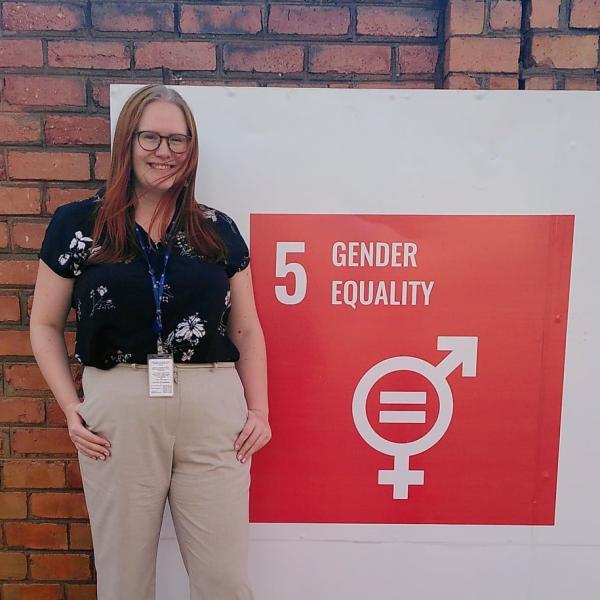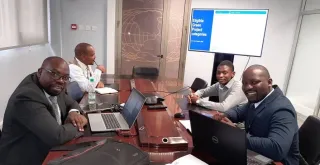Biodiversity management in Zambia calls for a broader financing landscape and innovation to mobilize resources for biodiversity conservation in line with the 2030 Agenda. On the occasion of International Day for Biological Diversity, UN Volunteers with the UN Development Programme (UNDP) share how identifying a financial solution can be the first step in building a shared future for all.
The Biodiversity Finance Initiative (BIOFIN) is a global initiative under UNDP that currently operates in 41 countries to create sustainable financial solutions that not only protect biodiversity, but also let it flourish.
As part of the initiative, Joshua Mabeta, a national UN Volunteer Research Assistant with UNDP, has been working to achieve the broader biodiversity conservation goal by developing the Biodiversity Finance Plan.
Joshua is also currently working with the three financial sector regulators in Zambia that constitute a Green Finance Mainstreaming Working Group to mainstream green finance in the financial sector, by developing a green finance policy and tagging/reporting system.
Given the huge financial need for effective biodiversity conservation, government financing alone is not enough. For instance, budget allocation towards biodiversity management in Zambia is less than two per cent of Zambia’s Gross Domestic Product and less than one per cent of the total national budget. This calls for a broader financing landscape and innovation to mobilize resources for biodiversity conservation in line with the 2030 Agenda.
"Current biodiversity loss can only be reversed through concerted efforts by government, private institutions and civil society organizations and measures that enhance nature’s ability to provide critical ecosystem services," Joshua says.
The COVID-19 pandemic era is a stark reminder that our health depends on the planet’s health; hence we need to conserve our biodiversity to avert future pandemics. Anthropogenic activities not only disrupt the balance of nature, but also have the potential to increase the spread and transmission of diseases between animals and human beings. More than ever, we need to embrace innovative financing mechanisms that enhance biodiversity conservation. --Joshua Mabeta, national UN Volunteer Research Assistant with UNDP, Zambia
Green finance (i.e. green bonds) is a new phenomenon in Zambia. With the support of the BIOFIN Zambia team, Joshua contributed towards the provision of capacity building in green finance to various key stakeholders as Zambia positions itself to be a green investment hub.
"Through our engagement with strategic partners, mainstreaming of green finance into the financial sector has gained momentum," Joshua explains. "The green bond guidelines and listing rules that have since been published by the Securities and Exchange Commission will be catalytic for developing the green bond market in Zambia and the issuance of the future green bonds for biodiversity and climate change projects.".
It is also worth noting that the Government passed the Zambia Development Agency Amendment Bill that will culminate in reducing the minimum investment threshold from US $500,000 to US $50,000. This new policy development means projects of a biodiversity conservation nature, including those earmarked as priority sectors by the government, will enjoy fiscal and non-fiscal incentives.
Sofia Karlsson (Sweden) is another UN Volunteer serving as an Associate Programme Officer with BIOFIN in Lusaka, Zambia. Sofia supports multiple projects at the Environment and Energy Unit, ranging from climate-resilient agriculture to assisting with Zambia’s National Determined Contribution (NDC) revision process. Her assignment is fully funded by the Government of Sweden.
Natural resources and biodiversity underpin many people’s livelihoods in Zambia, but climate change has put pressure on ecosystems and led to habitat degradation. Whilst it can at times feel abstract, enabling more financing is crucial to biodiversity conservation and underpins the achievement of SDG14 and SDG15, relating to life under water and life on land. --Sofia Karlsson, UN Volunteer Associate Programme Officer with UNDP
BIOFIN has estimated that we need to close a yearly global finance gap of US $681 billion to have a chance of protecting and restoring nature. Following that, in Zambia, which has ample opportunities to benefit from green financing, more regulations and clearer pathways toward biodiversity financing are needed.
"Zambia has a National Biodiversity Strategy and Action Plan that aims to value, conserve and restore biodiversity. However, With the emergence of the post-2020 global biodiversity framework, which is currently being formulated and is expected to be approved later this year at the UN Biodiversity Conference in Kunming, China, this plan needs to be updated to be in line with the new framework," Sofia shares. This process is also an opportunity to improve the existing plan, which would benefit from a more robust monitoring and evaluation framework to track progress."
Together with her background in gender, Sofia has also been providing technical support to national stakeholders, with a focus on gender equality and inclusion, to ensure that no one is left behind and everyone can benefit equally from Zambia’s biodiversity and natural resources.
I am proud of my work to ensure that biodiversity conservation efforts are intersectional and inclusive. Equality and equity are also what comes to mind when I reflect on the theme for this year’s International Day of Biological Diversity: “Building a shared future for all life”. I am grateful to be able to contribute to this future as a UN Volunteer. --Sofia Karlsson


